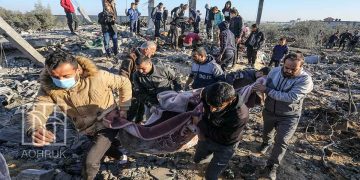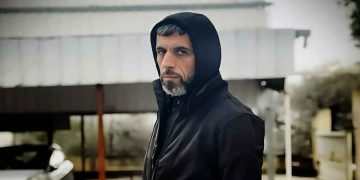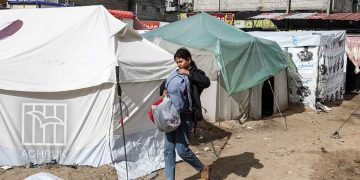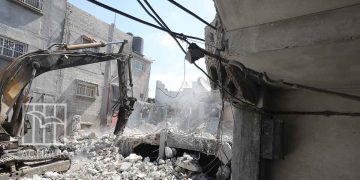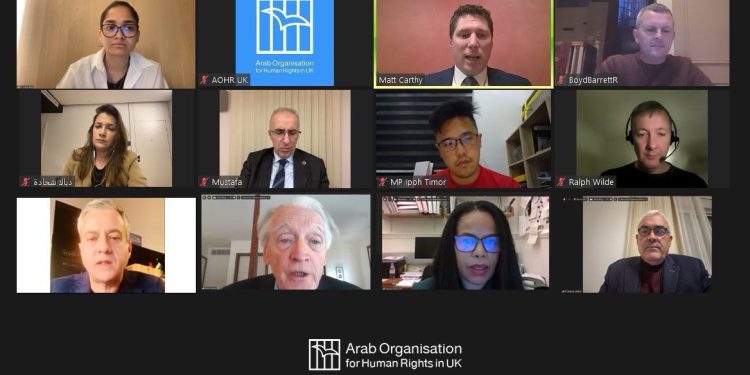On Thursday, 18th of January 2024, Arab Organisation for Human Rights in the UK (AOHR UK) held a Webinar titled, “How can South Africa’s case against the Israeli occupation be supported in the ICJ?”.
The Webinar featured a distinguished lineup of guests including Professor Francis Boyle, an international law expert; Claudia Webbe MP, a Member of Parliament of the United Kingdom; Matt Carthy and Richard Boyd Barrett, Members of the Irish Parliament; Mustafa Kaya, a Member of the Turkish Parliament; Shawan Jabarin, Director of Al-Haq Foundation; Diala Chehade, a former lawyer at the ICC; Michele Piras, a former MP at the Italian Parliament; Howard Lee Chuan, a Member of the Malaysian Parliament; and Dr. Ralph Wilde, an academic and expert in public international law.
The panellists addressed a range of topics, from the legal grounds for holding Israel accountable in the ICJ case for genocide against Gaza, to the role of various parliaments in pressuring their respective governments to join South Africa’s case against Israel at the ICJ. The discussion also highlighted the humanitarian crisis in Gaza, the importance of documenting and presenting evidence of human rights violations, and the potential legal recourse for victims of genocide.
This report aims to provide a comprehensive summary of the Webinar, shedding light on the various perspectives presented and the implications of this case on international law and human rights advocacy. It underscores the importance of collective action and the role of the international community in enforcing accountability.
“The role of the UK Parliament in pressuring the government to cease arming Israel and support South Africa’s case was also discussed. Claudia Webbe MP, a Member of Parliament of the United Kingdom, stressed the need for the UK to align its actions with the will of the electorate and actively contribute to resolving the catastrophe in Palestine. She described it as follows: “The UK’s political establishment is directly at odds with the will of the electorate… The UK has a particular responsibility to do everything it can to resolve the catastrophe in Palestine and end the slaughter and forced transfer of 2 million people”.
Then she added: “The UK public outcry is clear, and I stand by the spirit and resilience of the Palestinian people. I will continue to do everything I can in my power to change the bad and to support the good we’re talking about. What is being done is a war against humanity. I believe the people that come onto the streets week after week out in the UK are on the right side of history.”
Matt Carthy, Member of the Irish Parliament, commended South Africa for bringing the case against Israel to the International Court of Justice, stating, “In bringing the case against Israel to the International Court of Justice, the South African government has done humanity a great service.” Carthy further emphasised the compelling nature of the case presented by the South African legal team, asserting, “The case against Israel that was presented by the South African legal team was absolutely compelling… Israel is in gross violation of international law and that, as I believe it, that Israel is in breach of the Genocide Convention.”
Recognising the urgency of the situation, Carthy called for immediate action from Ireland and other like-minded countries, stating, “The time for Ireland and for like-minded countries, countries that are proud of having a consistent approach to international law. The time to act is now. The time to stand up for international law, for international humanitarian law, for the UN Charter, is now.” Carthy’s remarks underscored the importance of upholding international law and supporting South Africa’s case as a means to hold Israel accountable for its violations.
During the Webinar, the humanitarian crisis in Gaza was further examined, along with the Irish Parliament’s role in advocating for international human rights.
According to Richard Boyd Barrett, a Member of the Irish Parliament, “Israel is not a normal state; Israel is a state built on ethnic cleansing and occupation. The massacre we’re seeing now is the logical outworking of a stage that is built on that sort of uncivilised, barbaric regime.” His statement portrayed his firm belief that the ongoing violence in Gaza is a direct consequence of an uncivilised and barbaric regime rooted in ethnic cleansing.
Barrett further emphasised the strength of the South African legal team’s argument, asserting, “Anybody who listens to the South African legal team… They clearly presented an irrefutable case of genocide… Israel has done all of the things that are defined as genocide in the Genocide Convention.” His remarks highlighted his conviction that the evidence presented by the South African legal team established a compelling case of genocide, with Israel’s actions aligning with the criteria outlined in the Genocide Convention.
Mustafa Kaya, a Member of the Turkish Parliament passionately asserted, “Cases against Israel should be increased. Israel should be convicted as a genocidal state. The whole world must see that. South Africa is not alone; we need to unify against Israeli crimes!” His statement emphasised the necessity of raising awareness globally and advocating for collective action against the crimes committed by Israel.
In addition, Kaya highlighted the urgency of the situation, stating, “Because the genocide could drag our entire region and even humanity into the great disaster, urgent steps must be taken both to alleviate the suffering in Gaza and for the future of our regions.”
Then Kaya expressed hope for a shift in the perception of Israel due to its continued acts of violence. He stated, “With this genocide, Israel is losing their sympathy, and as they continue to murder innocent people, I personally hope that in the near future, the Palestinians will come to a position to establish their independent state as they paint the whole world’s sympathy.”
Shawan Jabarin, the Director of Al-Haq Foundation, lauded South Africa for its courageous and commendable act of upholding its obligations under the Genocide Convention. He expressed deep appreciation for South Africa’s commitment to fulfilling its legal duties.
Jabarin stated, “The move of South Africa is brave and highly appreciated. It’s a step in which South Africa expressed its respect for abidance by its obligations under the Genocide Convention.”
Regarding the situation in the Gaza Strip, Jabarin strongly argued that the scale and severity of the crimes being perpetrated represent an unprecedented level of atrocity. He asserted, “What is happening right now in the Gaza Strip is any precedent in terms of scale and equality of crimes that are perpetrated… This makes us argue strongly that Israel has committed genocide.”
By referring to Israel as an “outlaw state,” Diala Chehade, a former Lawyer at the International Criminal Court, conveyed her belief that the country’s consistent violations of international law and United Nations resolutions place it outside the boundaries of accepted norms and principles, where Chehade stated, “Israel should be considered as an outlaw state since it is one of the states that has violated the most United Nations Security resolutions.”
Expressing frustration with the prevailing narrative, Michele Piras, a former Member of Parliament at the Italian Parliament asserted, “Enough hypocrisy! Stop calling an apartheid regime a democracy and the occupation of foreign lands a self-defence. If you want peace, act for peace; if you want justice, act for justice. There is no third way.”
Further Piras stated, “We are clearly faced with a case of ethnic cleansing as a direct result of the ongoing occupation policy and of the international inactivity.” His statement drew attention to the consequences of the occupation policy, emphasising the process of ethnic cleansing and criticising the lack of effective international action to address the issue.
Howard Lee Chuan, a Member of the Malaysian Parliament, urged the International Court of Justice (ICJ) to play a crucial role in delivering justice and uncovering the truth that lies behind the propaganda perpetuated by Israel and its allies. He emphasised the importance of implementing economic measures and legal actions to hold Israel accountable for its actions.
Lee Chuan asserted, “We call upon the ICJ to be the crucible of justice, helping the ICJ to fulfil its duty of dismantling the propaganda spread by Israel and its allies. This will unveil the horrifying truth, written not in ink but in the blood of innocent Palestinians.”
Dr. Ralph Wilde, an academic and public law expert, drew attention to the existence of two cases currently before the International Court of Justice (ICJ). He highlighted the genocide case initiated by South Africa against Israel, which has been mentioned previously. Additionally, he emphasised that the second case addresses a broader range of issues, specifically focusing on the legality of Israel’s exercise of military authority over both the Palestinian Gaza Strip and the Palestinian West Bank.
Dr. Wilde stated, “There are, in fact, 2 cases before the International Court of Justice, one of them being the genocide case brought by South Africa against Israel, which has been referred to thus far. The second case not only encompasses the specific violation of international law through the commission of genocide but also addresses a much wider range of issues. It specifically questions the legal grounds for Israel’s exercise of military authority over not only the Palestinian Gaza Strip but also the Palestinian West Bank.”
The Webinar concluded with a call for global participation and collective action to support South Africa’s case against Israeli occupation. (AOHR UK) remains committed to advocating for justice, accountability, and the protection of human rights in the region.


